The Duck Hunter’s Guide to Picking a Puppy

By Bill Miller
It’s a moment every waterfowl hunter loves … and dreads. You’re in a clean, well-lit kennel building or a grassy backyard with a 3-foot tall wire playpen as its centerpiece. You’re looking down into a mass of youthful canines frolicking, joyously barking and peacefully sleeping all at once.
Picking a puppy is both joyful and nerve-racking, because you want to choose the best pup to serve as your duck dog and family companion from all the options wriggling in front of you.
So how do you pick the right one? By making a whole bunch of picks before you ever get to this day and this place. You prepare with the thought and scrutiny the management of an NFL team employs to prepare for the draft. Before you reach over that wire and pick up the puppy for your team, you need to pick the breed, sex, litter and breeder. This groundwork makes selecting an individual pup far less stressful, because it increases the odds that every pup in the litter will be a good choice.
Choosing a Breed
If you’re an experienced hunter who’s gunned over a variety of dogs, breed selection might come easily. If not, don’t fret: Consider each breed’s temperament, size, inherent health issues, exercise requirements and your lifestyle. There are tons of resources providing this information, including the American Kennel Club’s Breed Selector. Learn as much as you can to narrow your search, then seek out your potential breeds’ “parent clubs” — but make sure you pick field clubs rather than show clubs. Then, if you haven’t hunted with your finalist breeds before, make it a point to find serious, local owners and see if you can observe training sessions. Time in the blind is even better, if you can snag invites.
If you’re totally confused and stressed by breed selection, consider defaulting to the Labrador retriever. There could be a better breed out there for you, but Labs are a safe choice because they’re trainable, voracious duck dogs with personalities suited to a wide variety of homes.
Male or Female?
Picking a breed can be daunting, but you only have two choices for the next determination: Do you want a male or female pup? Some typical differences exist between the sexes. Males tend to be bolder, higher driven and more aggressive, while females tend to be faster learners, a bit less territorial and more biddable. These are generalizations, of course, and they don’t always hold true. Further, many experienced trainers have told me their best dogs have been females with male-like tendencies.
If opting for a female, however, don’t overlook the possibility of her heat cycle interrupting duck season. You could consider having her spayed, but that’s a topic for another day.
Finding the Right Breeder
The next level of research is to find the right breeder. Any given day, you can go online or check classifieds to find puppies for sale. These “backyard litters” often result because two hunting buddies with good dogs decide breeding them should produce a great litter of pups. And maybe it will, but often it doesn’t.
On the other hand, professional and dedicated amateur breeders plan litters based on research and extensive experience. Unlike more casual dog breeders, pros don’t just look at the traits of the individual dogs they’re breeding, but at entire pedigrees and lines. Thus they’re better able to predict what traits are likely to be exhibited by the litter.
The parent clubs of most breeds are more than happy to recommend respected breeders in your area with the type of genetic lines you’re looking for.
Visit Before Buying
Whether the breeder you select is a pro or more casual operation, make every effort to get to know them before settling on the litter. Nothing makes or breaks a puppy pick more than the breeder’s planning and care of the litter.
First, make sure the breeder is meticulous about the health of the puppies. Ask for the name of the vet who will handle the litter’s shots and other health matters. Inspect the facility where the litter will be whelped and raised. If there’s ever hesitation by the breeder about letting you visit, that’s a red flag — find another breeder who will.
Ask also about his or her socialization process. You want to hear things like, “Our pups are each held in human hands at least three times a day from the day they are whelped.” It’s important the pups are properly introduced to kids, other dogs and as many home-environment situations as possible.
Finally, ask what led the breeder to select the parents of the upcoming litter. This will quickly reveal his or her level of commitment to turning out top-quality pups.
If possible, ask to see the canine parents-to-be in a training situation to further cement your confidence that their genes are worthy of passing on — and investing in.
Draft Day
So you’re finally standing there, ready to reach over the wire and pick a puppy. There’s a battery of tests you can try, like judging aggressiveness by rolling them over on their backs to observe whether they struggle or seeing how they approach a wing-clipped pigeon. The problem is you’re judging a one-time reaction at one moment in time. Who’s to say the pup isn’t having an off day?
Since you’ve invested time and energy to gain trust in a breeder, consider relying on him or her to help in the selection of the pup. Provide a detailed description of what you’re looking for, whether it’s a high-speed Ferrari or dependable pickup truck, a dog that’s all business or one that’s all tail wagging, all the time.
It makes sense to rely on the recommendations of someone who has multiple daily contacts with the puppies and sees individual personalities develop over the weeks. In fact, some breeders always select puppies for their buyers, and I agree with that business model. In short, the best way to pick the perfect puppy for your family is to let a trusted, well-informed breeder do it for you.

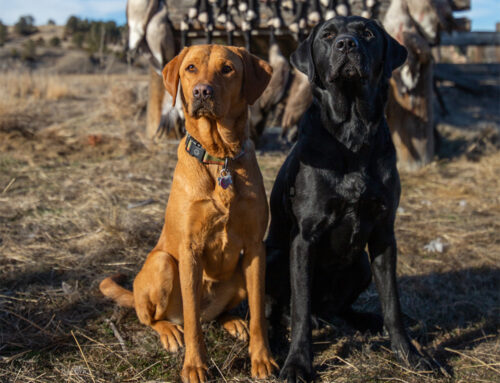
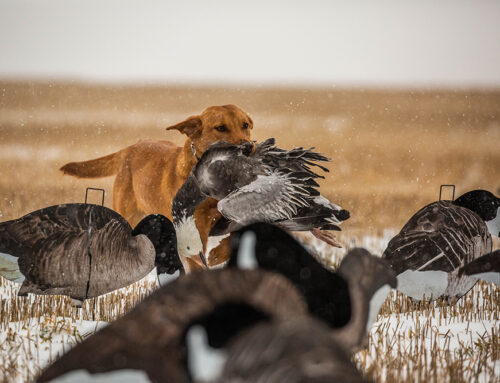
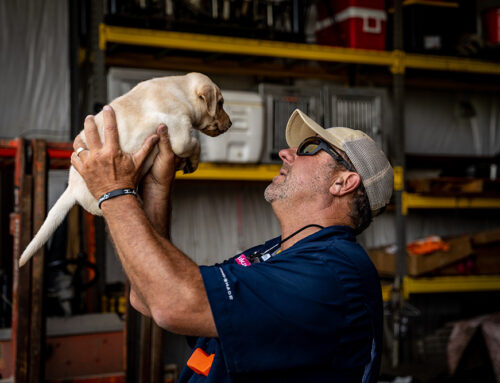
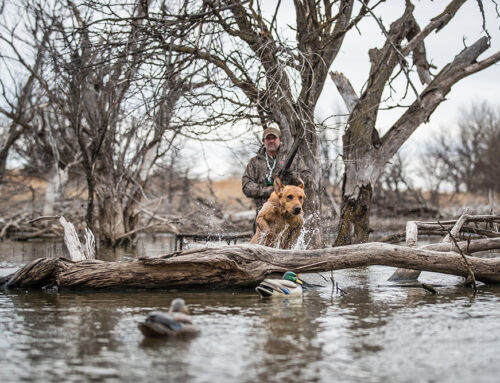
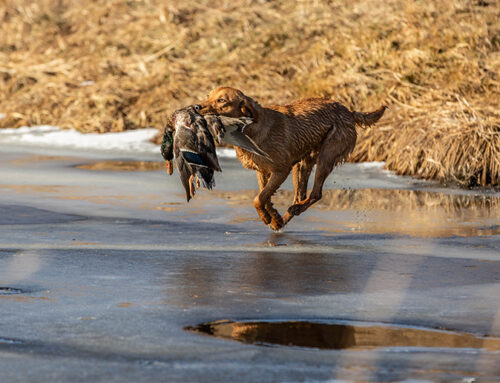
I’m an avid duck hunter. I do it because I like to see my dog retrieve! Granted some shooting goes hand in hand. But she’s a pet for about 9 months of the year. A companion. I get lazy when it’s 10 below but get her out once a week in the winter. lot’s of dummies and a launcher. As for food? I adjust what she eats. Never bought a dog from a breeder. But chose my pups based on roughly what he said. Training! Training! 4 year old yellow lab. Almost better than my 13 year old! [ She can’t get the title till the old one is gone!] But by reinforcing sit and stay ect. all summer. Use the field blind if you got one. I was ready to give this pup away for her first year with me. By year 2? Best dog I ever had! E-Collar ! You’d be surprised how little yo use it!
Very good article! As a breeder of hunting weimaraners, we follow all this but cannot stress enough the first 8 weeks of socialization and training by the breeder. We expose the pups to water, birds and shooting at a local gun club while having fun. It is so critical to set them up for life in the first 12 weeks.
Great article and very true. My problem right now is that I can’t find any breeders in my area. Looking for another water dog for hunting. Is there a guide for finding Labrador breeders or should I just try my luck on the internet?
What area are you in? Did you find one?
I have a litter that will be ready in 6 weeks if you are still looking or know anyone – both parents are AKC and champion bloodlines
This is a good article that you have covered here in detail, thanks